Associate Dean of Faculty Research and Professor of Law Kristen Barnes recently delivered the keynote address at Cornell University’s Town and Gown Conference on housing. Barnes’s address was titled “Housing and the Future: Challenges and Opportunities.” Barnes is also a Visiting Professor, City and Regional Planning at Cornell University.
News
Shahzaib Hafeez L’26 and Elyse Maniccia L’26 Won the Mackenzie Hughes LLP Edmund H. Lewis Appellate Advocacy Competition
The team of Shahzaib Hafeez L’26 and Elyse Maniccia L’26 prevailed over Garrison Funk L’25 and Daniel Morgan L’25 in the final round of the Mackenzie Hughes LLP Edmund H. Lewis Appellate Advocacy Competition. Hafeez and Maniccia won the Best Brief and Morgan was selected as the Best Oral Advocate.
Final round judges were Gabrielle Bull L’19 (Associate Attorney at Martin, Ganotis, Brown, Mould & Currie PC), Gavin Gretsky L’24 (Associate at Bond, Schoeneck, and King PLLC), Professor Suzette Meléndez, and Tom Taylor ’79, L’87 (Of Counsel, Bousquet Holstein PLLC.)
Sponsored by Syracuse law firm Mackenzie Hughes LLP, this competition is open to two-person teams consisting of second and third-year Syracuse Law students. The competition is named for the Hon. Edmund H. Lewis L’1909, a distinguished alumnus of Syracuse University College of Law, a partner at Mackenzie Hughes, and a Chief Judge of the New York Court of Appeals. Each year, volunteer judges evaluate the teams’ written appellate briefs as well as oral argument performance through multiple rounds.
The College of Law would like to thank all the judges and evaluators.
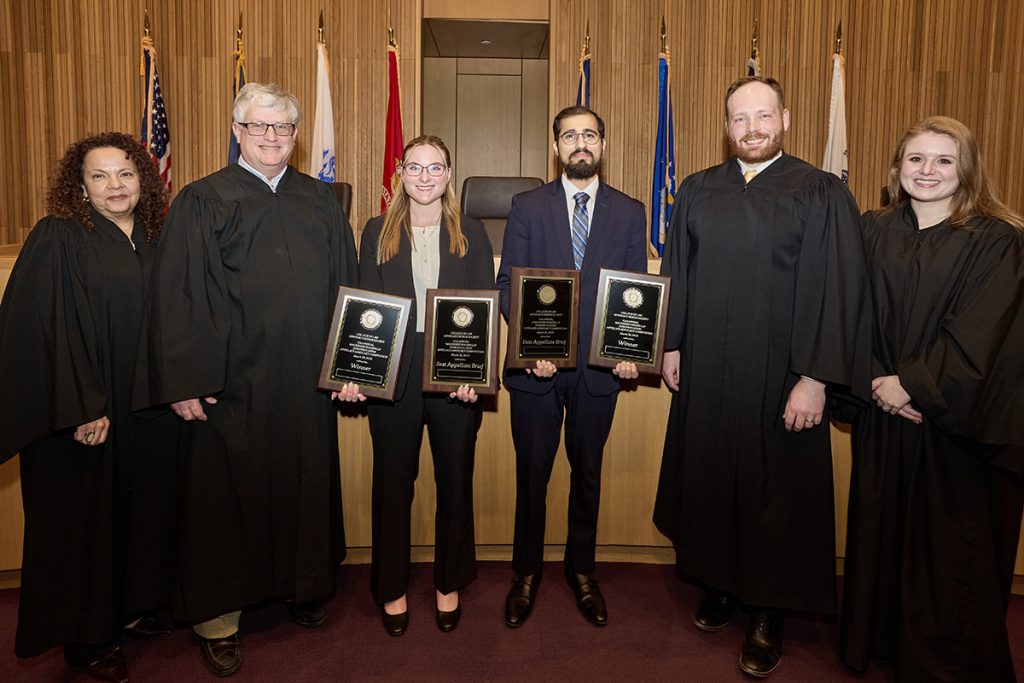
Professor Gregory Germain on the Death Penalty in the Luigi Mangione Trial
Professor of Law Gregory Germain spoke with The Guardian for an article on the Department of Justice seeking the death penalty in the Luigi Mangione trial.
Germain said the death penalty raises the stakes and adds “pressure” on Mangione to accept a life sentence if such a plea deal were offered.
German noted, however, that almost all the recent death penalty cases unfolded under Trump’s first term and surmised that his justice department would not agree to a deal for life imprisonment.
“He has political reasons, wanting to seem ‘tough on crime’ by supporting the death penalty,” Germain said.
“You’re Running Out of Time” – Professor Robert Nassau Provides Guidance on April 15 Deadline to File 2021 Taxes and Claim Stimulus Check
Robert Nassau, Director of the Sherman F. Levey ’57, L’59 Low Income Taxpayer Clinic, recently spoke with CNBC on the April 15 deadline to file 2021 income taxes and claim the 2021 stimulus check.
“If you didn’t get the stimulus, you’re running out of time,” said Nassau.
While there are several free options for tax returns this season, some may not offer electronic filing for 2021 returns, Nassau warned.
If you’re forced to mail your 2021 return, you should send the filing via certified mail for “proof” you sent it by the April 15 deadline, he said.
“I’ve had situations where the IRS gets something after the filing [due] date, and they just reflexively say it’s too late,” Nassau said. “Spend the $5 and send it certified.”
Hon. Deborah Karalunas L’82 Selected As Recipient of 2025 Law Honors Award
From the age of 8, the Hon. Deborah Karalunas L’82 knew she wanted to be a judge. She admits she didn’t always know what the job entailed, but she was drawn to the law and had a gift of being a problem solver. She also appreciated the enduring support of her parents, who encouraged her to follow her dreams and taught by example the importance of hard work, integrity and compassion. Over the past four decades, Karalunas has taken those skills and values with her serving the Central New York community as a judge, lawyer and also an adjunct professor at the Syracuse University College of Law. In recognition of her distinguished career in the judiciary and unwavering commitment to advancing the careers and achievements of women in the legal profession, Karalunas has been selected for a 2025 Law Honors award from the Syracuse University Law Alumni Association (SULAA).
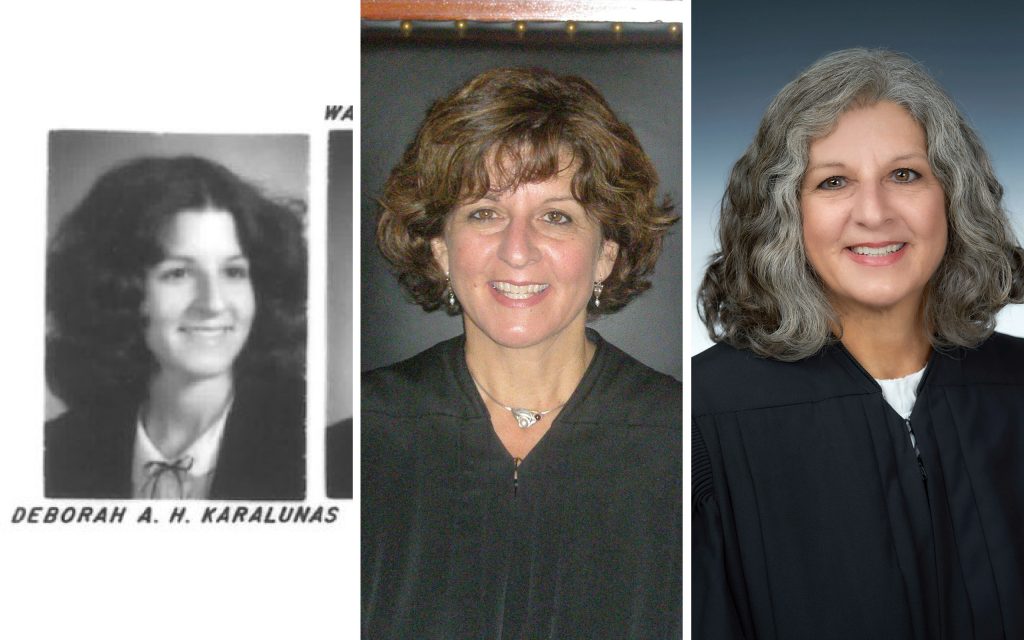
After receiving her undergraduate degree from Cornell University, Karalunas and her husband both came to Syracuse University—he for business and she for a law degree. At the time in the early ‘80s, the legal field was male dominated, but that did not deter Karalunas.
“Syracuse Law fully accepted me and the other women who were there, and I never felt ‘less than’ as a woman,” says Karalunas, who also had her first child, Sarah, while earning her law degree. “People were very supportive, and having a family during law school gave me perspective on how to balance the stress of studying, exams, etc. These were lessons that I took with me into my career.”
Karalunas credits the Syracuse Law faculty for inspiring her love of the law, a desire to achieve and a yearning to make a difference. “They were committed to making each student a great lawyer and an even greater person. These dedicated professors made sure we knew that our successes would not be measured by how much money we made but by our integrity and reputation, how much we gave to others and how many lives we positively influenced,” she explains.
After completing her degree, Karalunas was a law clerk for Chief Judge Howard G. Munson, United States District Court for the Northern District of New York. One year later, she joined Bond, Schoeneck and King LLP, a local law firm, as a civil litigator. While she admits the legal profession was still a man’s world, Karalunas continued to persevere, eventually becoming the firm’s second female partner and the first female to be a partner with a family. She remembers often pulling all-nighters, so that she could be with her family instead of coming into work on Saturdays, like many of her male counterparts did.
After 20 years with Bond, Schoeneck and King, she decided her talent for problem solving might be put to good use as a judge. In 2003, she became a New York State Supreme Court Justice, 5th Judicial District. Karalunas was only the third female Supreme Court Justice elected in the 5th Judicial District, and today is the longest serving. She is also the first and only female to serve on the commercial division in Onondaga County. As a judge, she stays true to the values she learned from her family, her professors and peers, and Karalunas is especially proud when a Syracuse Law alumnus appears before her in court practicing law.
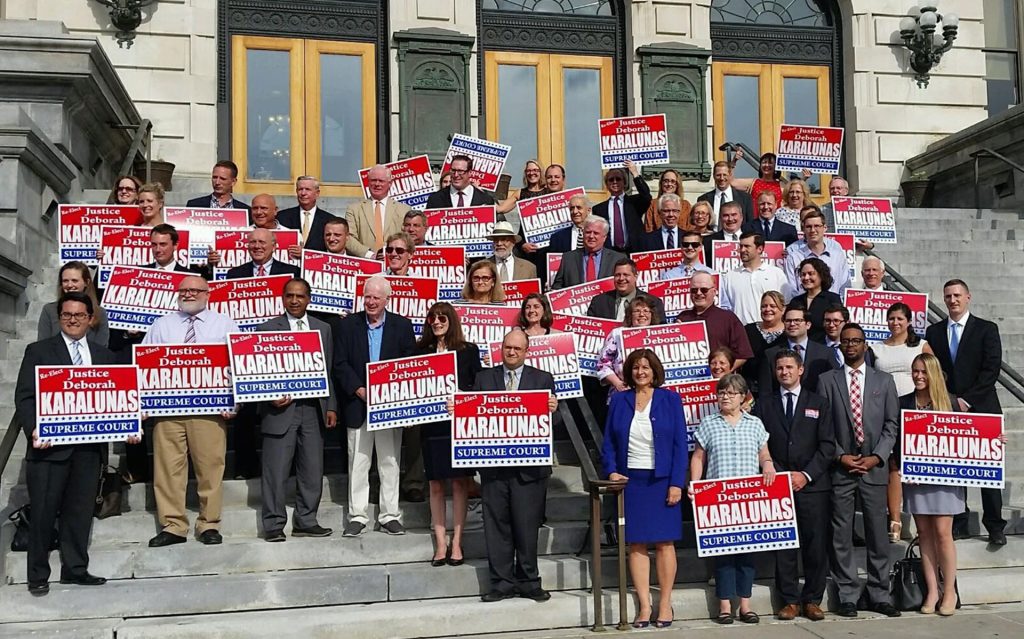

“I suppose I have broken a few glass ceilings and widened a few paths, particularly for women, in the years I’ve worked as a lawyer and a judge,” she says. “When you are treated fairly in an inclusive culture, a sense of belonging is created, and when you feel like you belong, you work harder and better.”
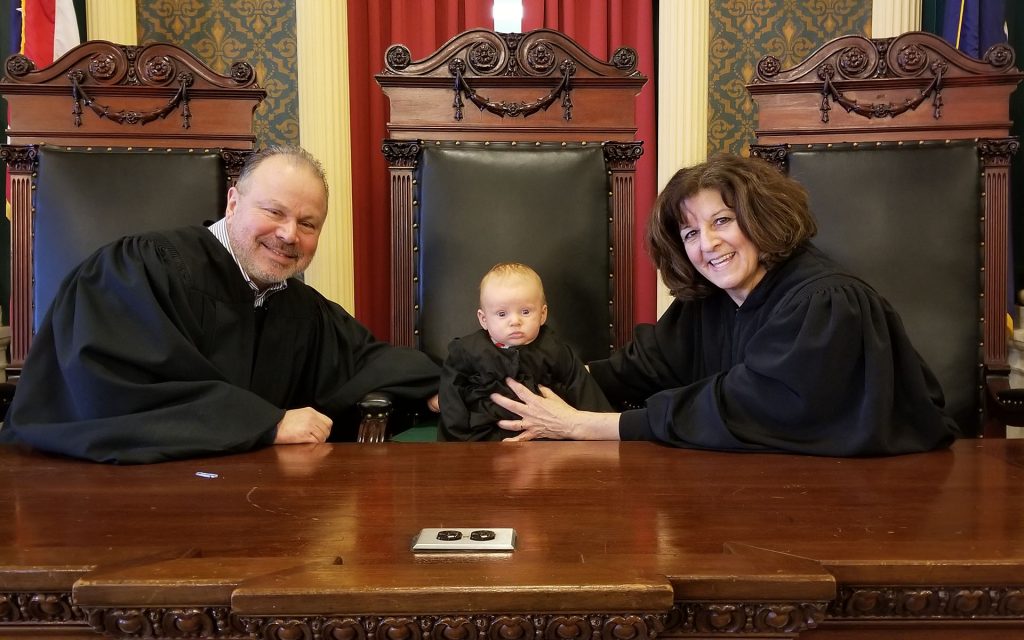
In 2013, in addition to her work as a judge, Karalunas came back to Syracuse Law—this time as an adjunct professor teaching New York Civil Practice. “From a faculty perspective, I am proud to see many more women not only studying law but being some of the School’s top achievers. I see a real confidence in women in my classes, and it’s clear that they have the ability to dream big,” says Karalunas, who also acts as a judge for moot court competitions and has recruited current students to work as externs in her chambers. “Teaching energizes me, and I feel that I have a whole lot of life experience to share. Part of my calling is to help people, so I hope I’m impacting Syracuse Law students—women and men—in a positive way.”
“Judge Karalunas’ distinguished career, from Syracuse University College of Law to becoming the first female administrative judge of the 5th Judicial District, exemplifies the very essence of the Law Honors award,” says Dean Terence Lau L’98. “Her unwavering commitment to justice, mentorship of future generations, and leadership in our legal community make her an inspiration to us all.”
Karalunas is humbled and proud to receive the 2025 Law Honors award. ‘I’m grateful to God for the gifts I have been given—a smidgen of wisdom, a love of life, a desire to serve, a forgiving heart, an aptitude for problem solving—and so many amazing opportunities,” she says. “I love my job. I love the law, and I love this profession. And, I am so very proud to be a graduate of the Syracuse University College of Law.”
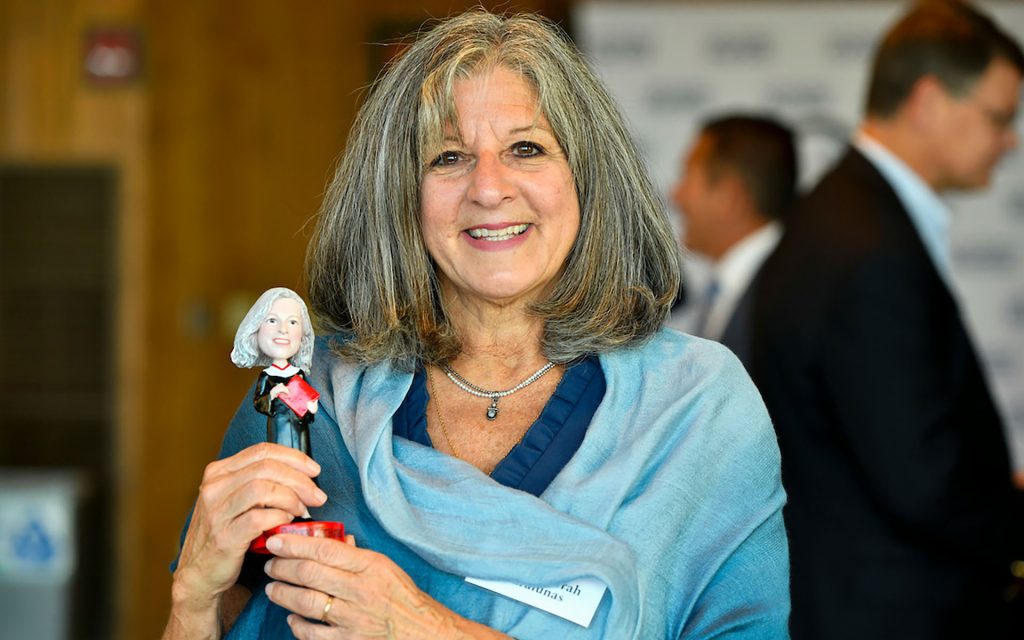
Richard Levy Jr. ’77 Receives 2025 Law Honors for Long-Time Commitment to Syracuse Law
Richard Levy Jr. L’77 served on the board of the Syracuse University Law Alumni Association (SULAA) from 2014 until 2023, bringing with him a true appreciation for his alma mater, extensive career experience and plenty of new ideas for bringing Syracuse Law alumni together for the betterment of the College of Law. One such idea was the establishment of an annual award to recognize alumni who had a significant impact on the Syracuse Law community. In 2015, this became the annual Law Honors award. Now, in recognition for advocating for the contributions of other alumni and for his years of leadership with SULAA, Levy, himself, is a 2025 recipient of the Law Honors award.
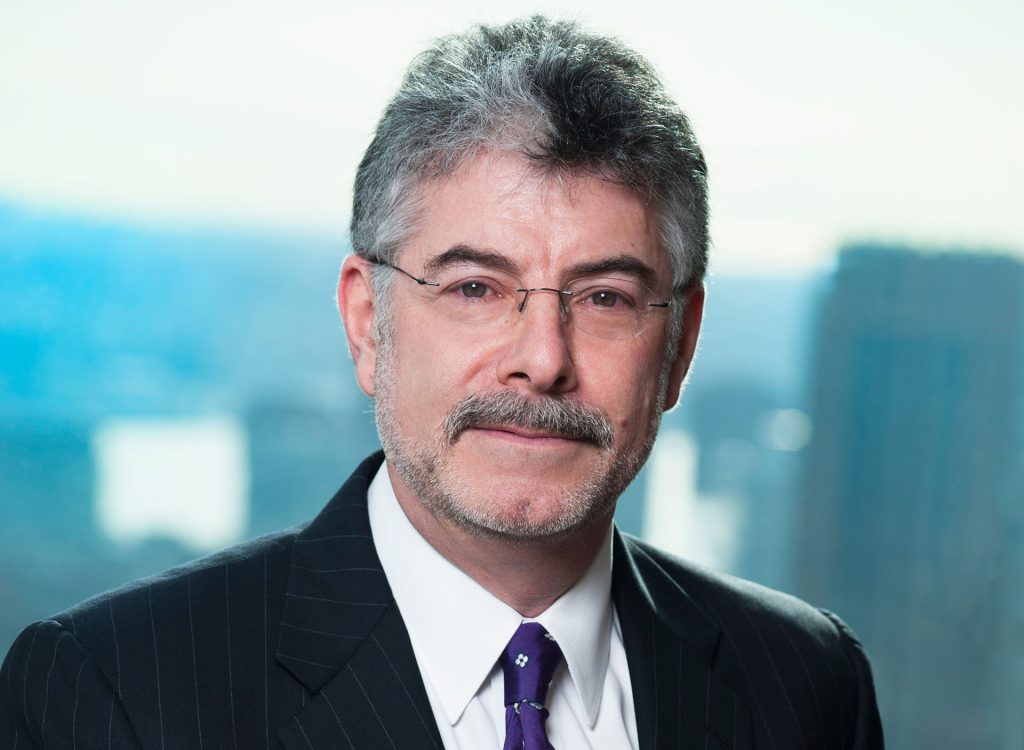
“I was always amazed at the accomplishments of the people who were recognized with the Law Honors award, and I never thought of myself as someone in the same league as these recipients,” says Levy, senior member of the bankruptcy, reorganization and creditors’ rights practice group at Pryor Cashman LLP in New York City. “So, to be chosen for the award, well, I am stunned but truly grateful to Syracuse Law.”
Levy has appreciated his affiliation with Syracuse Law since he arrived in August 1974, shortly after receiving his bachelor’s degree in political economy from Williams College. During his senior year, he applied to 14 law schools—and Syracuse was the only one that accepted him.
“Syracuse Law turned out to be a great fit for me – excellent professors, good friends and outstanding experiences—and law school was a lot more fun than I expected,” he says. “Looking back, I have never questioned where I ended up or the opportunities that Syracuse Law provided me.”
Levy took his studies seriously, graduating magna cum laude and as a member of the Order of the Coif and the law school’s Justinian Honor Society. He also devoted considerable time to other law school pursuits. In his second and third years, He was a research assistant for now-Emeritus Professor of Law Thomas Maroney ’61, L’63, who Levy counts to this day as a good friend. During those two years, Levy also served as a staff member and Notes and Comments editor of the Syracuse Law Review, which published his student note on an issue of antitrust law.
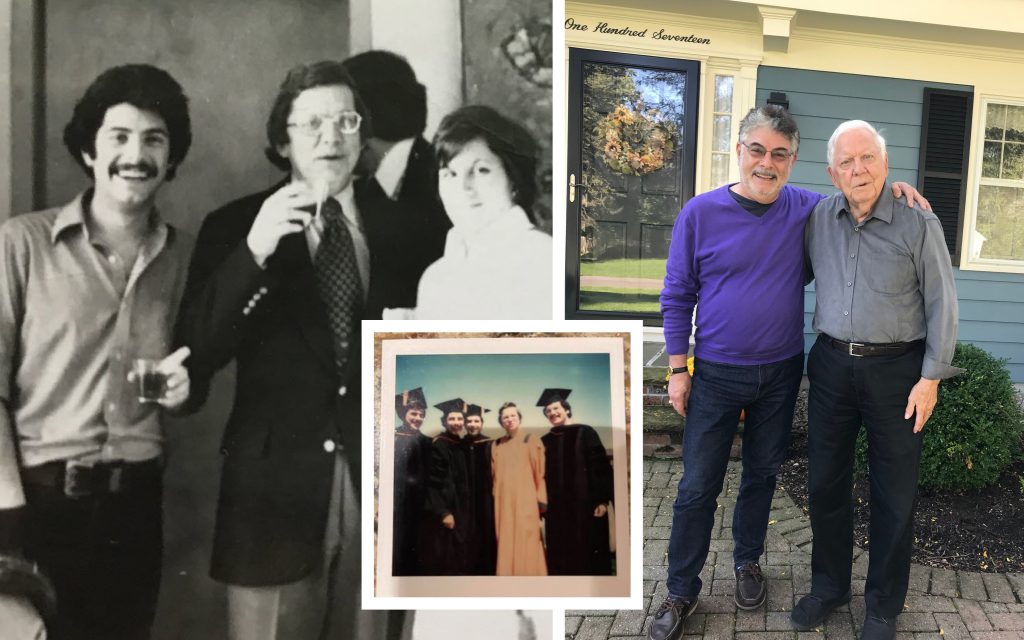
His first job after graduation was at a law firm in Washington, D.C., working in antitrust and trade regulation. Levy then moved on to a larger firm in New York City, where he practiced in antitrust and securities litigation. Still searching for his professional niche, he pursued several other opportunities before discovering how much he enjoyed bankruptcy law and has concentrated in that area ever since.
He joined Pryor Cashman as counsel in 1996, serving as a partner from 2003 until recently, when he became senior counsel to the firm. One of his career highlights came from leading the firm’s representation of many former customers of the failed securities investment firm run by Bernard Madoff, the infamous financier who was convicted in 2009 of defrauding thousands of investors out of more than $65 billion. In 2014, Levy argued the successful case before the U.S. Court of Appeals for the Second Circuit that significantly narrowed – by several billion dollars – the collective potential exposure of former customers on clawback claims asserted by the liquidating trustee of the securities firm.
Early in his career, Levy was not closely connected to Syracuse Law, as he was busy establishing himself as an attorney and raising two children with his wife, Carol Miller, also an attorney, although he did make annual gifts to the Law Alumni Fund and attended some regional events. However, in the late 1990s, he was working on a bankruptcy case in nearby Utica, New York, and decided to make a visit to the Syracuse campus. There, he connected with Maroney, other professors and several classmates in the area and renewed his connection after seeing how the law school was being invigorated. He became more involved as the plans to build what is now Dineen Hall moved forward.
”I loved my time on the SULAA board, and I especially prized my collaboration with former SULAA presidents Carey Ng L’02, Sarah Oliker L’03, Amy Vanderlyke Dygert L’07, Mark O’Brien L’14, and Colleen Gibbons L’17.
But, that wasn’t all. In 2021, he became a distinguished lecturer in law in the Syracuse Law JDinteractive program, teaching a condensed course in bankruptcy and creditors’ rights during the hybrid program’s frequent in-person residencies. Most recently, in March 2024, Levy reprised his course during a JDi residency week in Los Angeles.
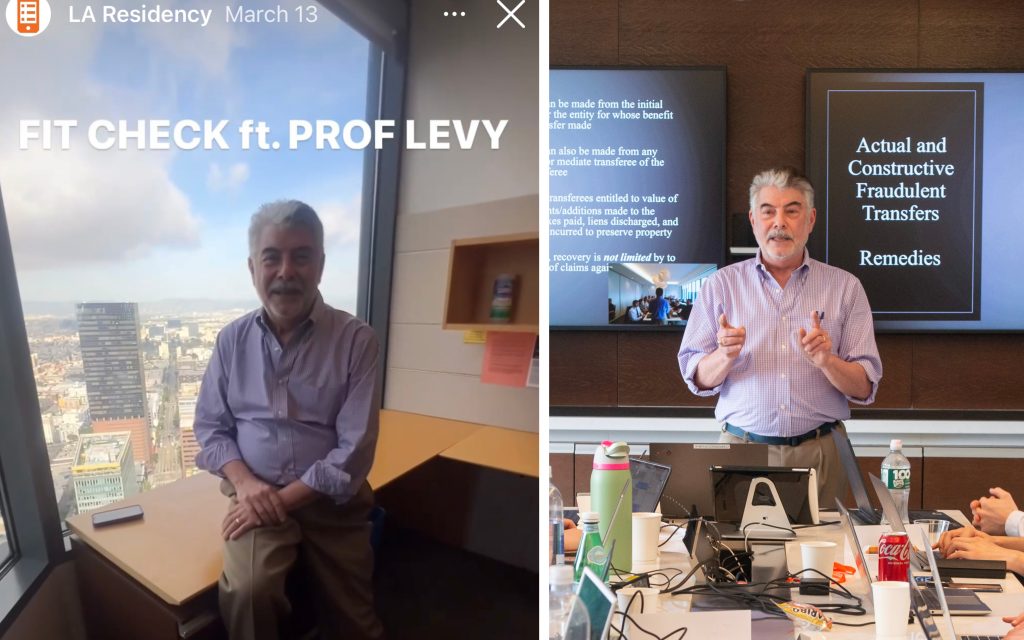
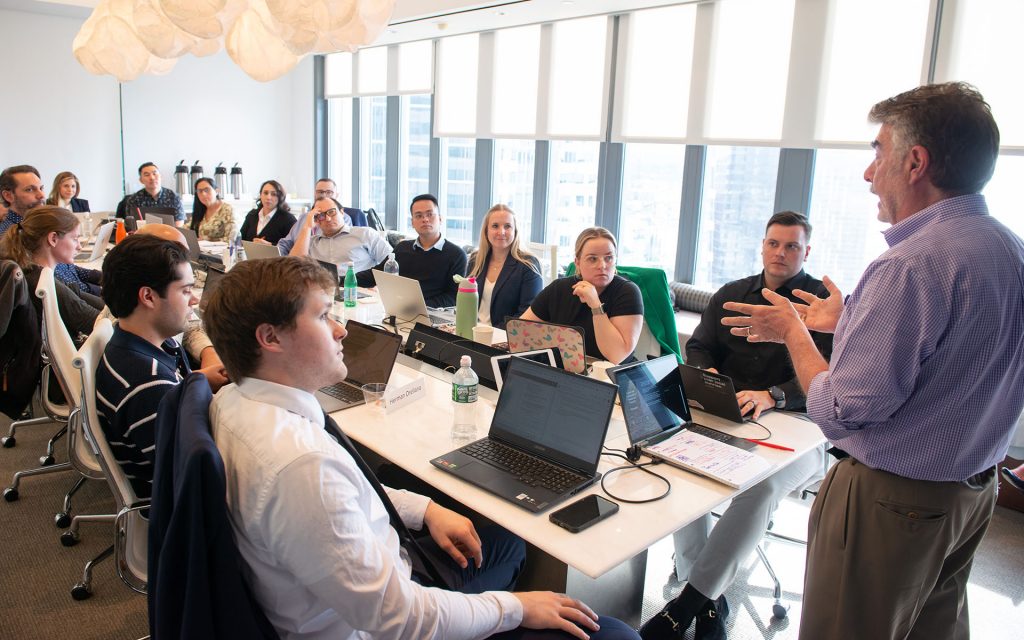
“My dad thought I would make a good teacher,” Levy says. “I wish I had followed his instinct and started teaching much sooner. It is challenging, stimulating, and rewarding!”
“Rich’s unwavering commitment to Syracuse University College of Law, from his exceptional career achievements to his tireless volunteerism and mentorship of our students, embodies the spirit of the Law Honors award,” says Dean Terence Lau L’98. “He is an inspiration to our entire community, demonstrating the profound impact a Syracuse Law graduate can have on his law school, the legal profession, and beyond.”
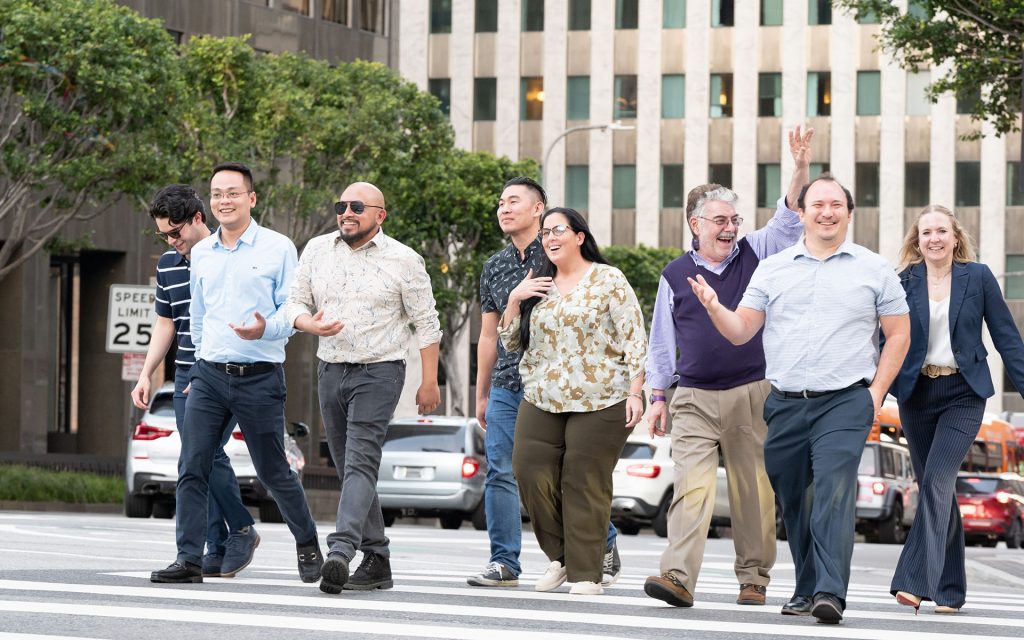
Alumni Recognize Professor Suzette Meléndez with Law Honors Award
The Syracuse University College of Law Alumni Association (SULAA) has selected Professor Suzette Meléndez to receive a Law Honors award. Meléndez was chosen as a recipient for her impactful contributions to the legal field, not only at Syracuse Law but across the larger University and New York state.
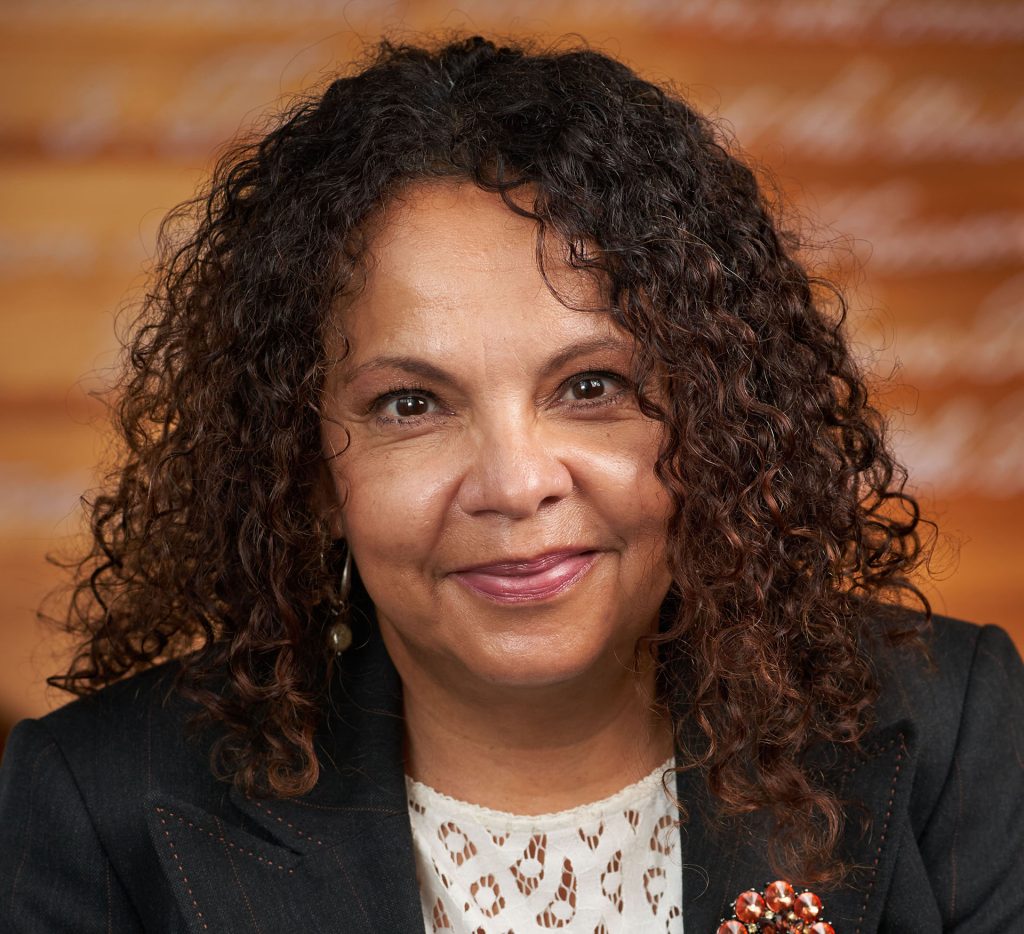
Meléndez received her law degree from the University of Connecticut. She practiced family law as a supervising attorney of the Domestic Violence Representation Project for Legal Services of New Jersey; and worked at the Legal Aid Society in New York City, representing clients in the areas of housing and public entitlement before joining the Syracuse Law faculty in 2002. Since then, she has incorporated her experience as an attorney into scholarly interests surrounding access to legal services for women and children, domestic violence and family law.
“Through a greater understanding of these topics, our students can see that not all children thrive or develop as they should or have the same opportunities as others depending on circumstances,” says Meléndez of her passion for teaching family law. “And, they also begin to understand that some families are genuinely different, while others are affected by circumstances they truly can’t control.”
Meléndez also serves as the co-director for the Syracuse Medical Legal Partnership (SMLP), a collaboration between Syracuse Law and SUNY Upstate Medical University’s pediatric unit, providing legal advocacy to ensure that vulnerable patient populations get only the best of care, which includes legal assistance in regard to education, safe housing, government aid programs and more. The SMLP provides an interdisciplinary educational experience for Syracuse law students, as well as medical students, residents and other medical professionals associated with SUNY Upstate. In addition, she is also the faculty advisor to the Latin American Student Association (LALSA) and the College of Law Family Law Society.
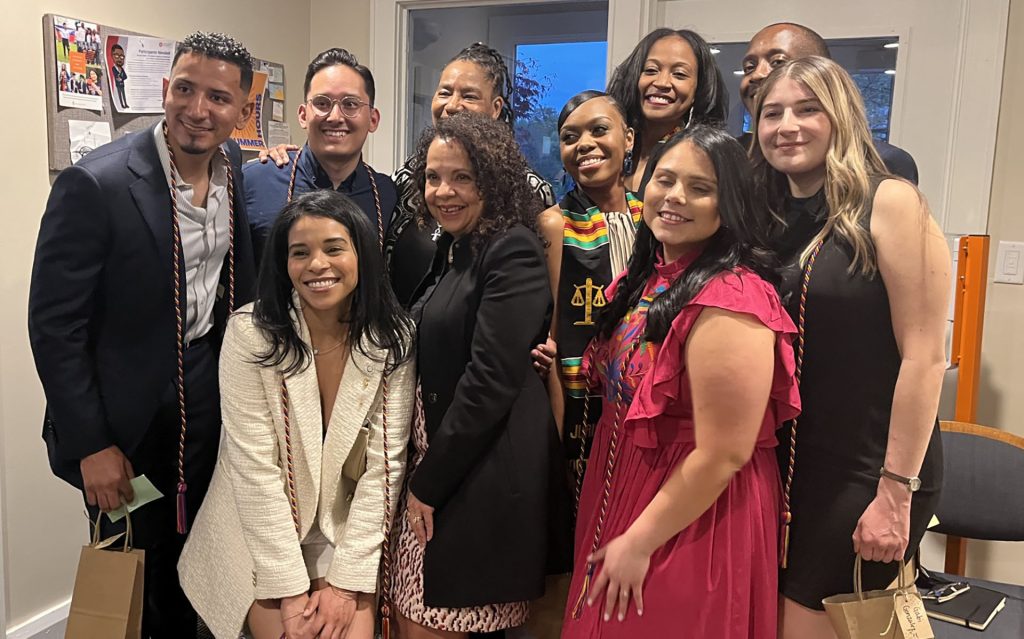
Meléndez has shared her career legal expertise by serving on boards, committees and memberships of organizations at Syracuse Law, the University and the larger community. Her present commitments include the board of the Central New York Women’s Bar Association; Arriba, the first Central New York Latine bar group that operates under the auspices of the Puerto Rican Bar Association, of which she is one of the original members; the New York State Indigent Legal Services board; the Onondaga County Bar Association; and the Friends of the Central Library. From 2003-2022, Meléndez served as the director of the former Syracuse Law Children’s Rights and Family Law Clinic.
Drawing inspiration from her lived experience, she says of her accomplishments, “It’s just honestly a love of people, and I think it comes from a place that I characterize as pride in my own identity and also an appreciation for other people’s cultures that are different from mine. I want all of my students to feel welcome, while fostering an atmosphere where people are free to speak, and people also stop to listen and learn from one another.”
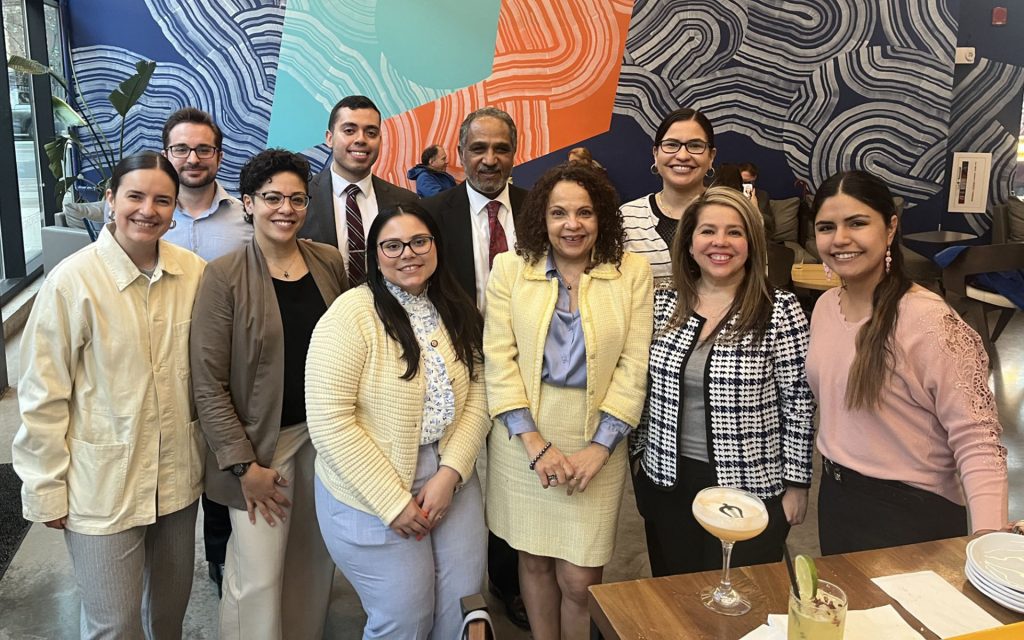
“Professor Meléndez’s unwavering dedication has truly made an impact on Syracuse University College of Law, fostering a welcoming environment for all,” says Dean Terence Lau L’98. “Her leadership in the classroom, across our University, and within the legal profession makes her a most deserving recipient of the Law Honors Award.”
Meléndez is especially proud to receive a Law Honors award from SULAA, as she knows that some of the alumni who selected her are former students from years past. “I love my students, past and present, more than they know,” she says. “Receiving this award is an affirmation of my work and motivates me to keep moving positively and productively.”
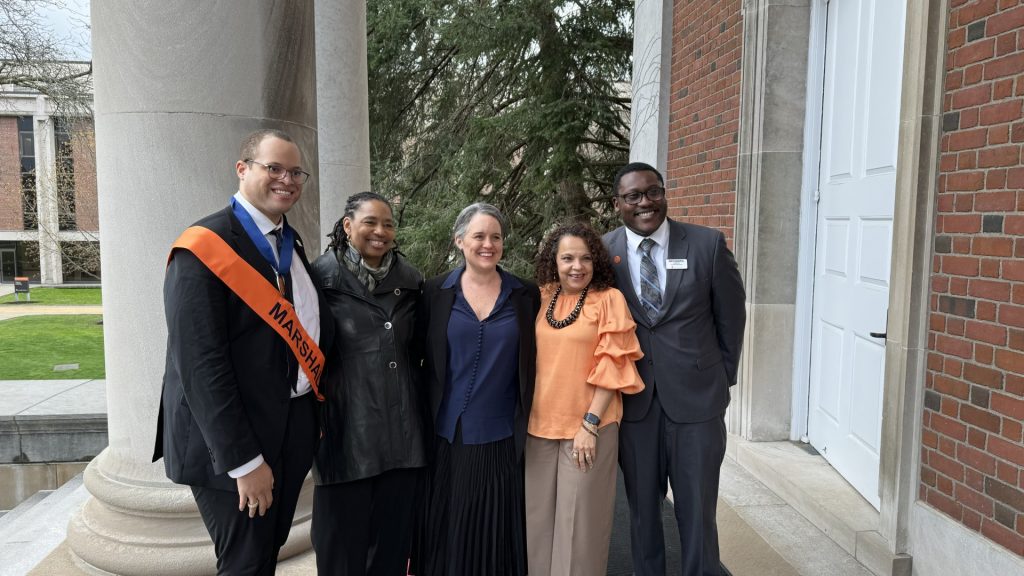
Professor Emeritus William C. Banks Discusses the Renewal of the Cybersecurity Information Sharing Act
Professor of Law Emeritus William C. Banks recently spoke with Politico for an article on the pending renewal of the Cybersecurity Information Sharing Act (CISA). Enacted in 2015, CISA incentivizes businesses to share threat intelligence data with the federal government or other companies. It is set to expire in September.
Banks said that he thinks the law should be reauthorized but expressed doubt that the Trump administration would prioritize renewing it.
“The Trump administration is mostly dismantling pieces of government, not creating them or reauthorizing them,” Banks said, adding that some conservative voices believe the law “messes with the private sector.”
Banks is the founding director of Syracuse University’s Institute for National Security and Counterterrorism, now known as the Institute for Security Policy and Law.
Youth Law Day Brings 200 High School Students to the College of Law
The College of Law’s annual Youth Law Day event recently brought more than 200 high school students from schools across Central New York to Dineen Hall for an introduction to the legal profession, learning about the role of attorneys in society, and how to chart a path to law school. The theme of the day was “Science and Technology in Law.”
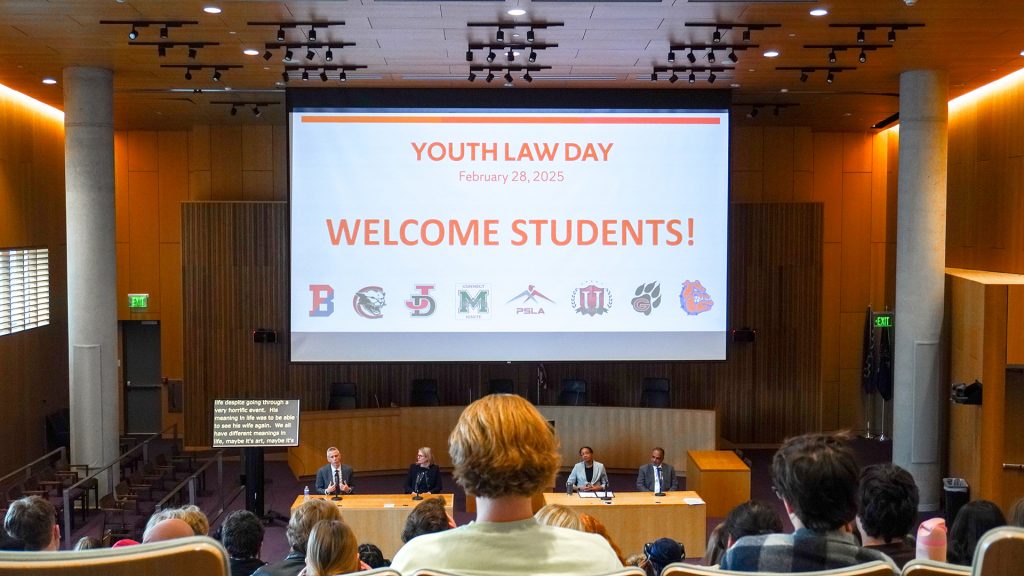
Participating schools were Binghamton High School, Corcoran High School, the Public Service Leadership Academy at Fowler High School, Geneva High School, Jamesville-DeWitt High School, Marcellus High School, Nottingham High School, and Utica Proctor High School. This year’s program was coordinated by Professor Lauryn Gouldin, co-founder of the Syracuse Civics Initiative.
The welcome address of the day was delivered by the Hon. Brenda K. Sannes, Chief United States District Judge for the Northern District of New York. Students then heard from a panel of judges that featured the Hon. Anthony Brindisi, the Hon. Beth Coombe, the Hon. Ramón E. Rivera L’94, and the Hon. Staci Dennis Taylor L’14. Professor Nina Brown of the Newhouse School of Public Communications then lectured on Ownership and AI.
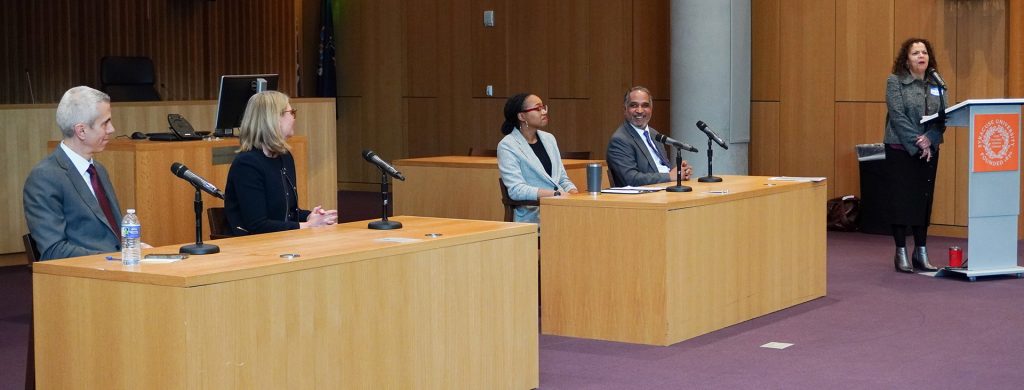
Before lunch, the students broke into groups to tackle a mock oral argument activity. This activity was led by current law students who gave them advice and feedback about oral argument and modeled the activity for them. While at lunch, students were able to network with faculty, alumni, and current law students.
Students then heard from a college admissions counselor who answered their questions about applying to law school, followed by a lecture called “The Life of a Criminal Case” by Gabriela Girona Wolfe L’16, Assistant Public Defender from the Northern District of New York.
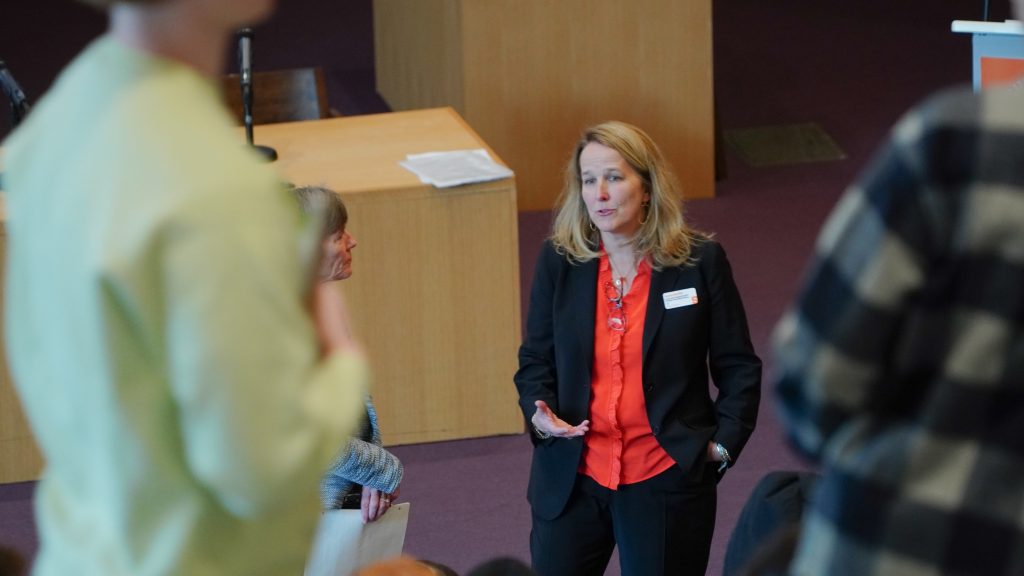
The visiting students were then able to ask a panel of current Syracuse Law students about their path to law school, how to prepare for the LSAT, good study and test-taking habits, and more. The panel was moderated by 3L Jesse Elmer and featured 2L Jocelyn Anctil, 3L James Cameron, and 2L Jared Park.
Kimberly Wolf Price L’03, Chief Strategy & Diversity Officer at Bond, Schoeneck & King PLLC, provided closing remarks.
Event sponsors were:
Syracuse University College of Law
Barclay Damon
Bond, Schoeneck & King, PLLC Law Firm
Bousquet Holstein
The Hon. Robert A. Katzmann Justice for All: Courts and the Community Initiative
Lexis Nexis
New York State Bar Association
The Onondaga County Bar Association
Syracuse Civics Initiative
Syracuse Student Bar Association
The Wladis Law Firm
Travis H.D. Lewin Advocacy Honor Society
United States District Court for the Northern District of New York
Professor Jenny Breen Reacts to Law Firms Being Targeted by President Trump
Professor Jenny Breen spoke with Newsday for the article “Trump Aims at Law Firms That
Opposed Him: Experts: Orders Designed To Tamp Down Dissent.”
“It’s very clear that he’s trying to raise the price of dissent, and he’s trying to make it really hard for people to challenge what the administration is doing,” said Breen.
The full article may be behind a paywall.
